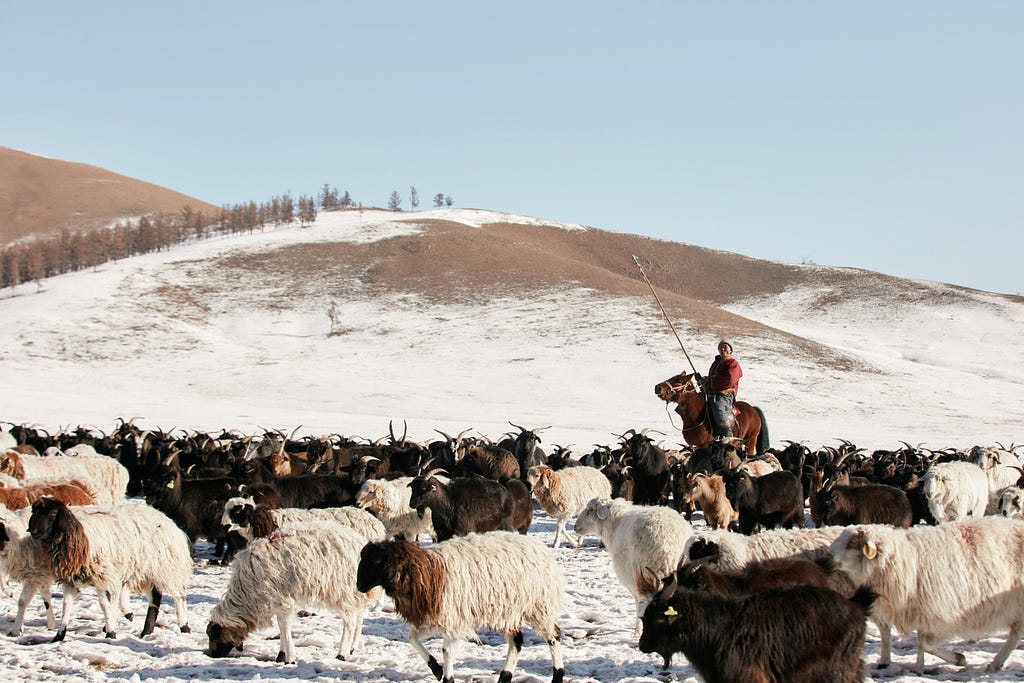Amarsaikhan Baatarsaikhan Of GOBI Cashmere On Why They Are Embracing Slow Fashion and Renewable Consumption
An Interview With Monica Sanders
Traceability: Know every single detail about your purchase and the product; know where it was sourced, created and how it is transported across national lines.
As ‘slow fashion’ grows in popularity, more fashion companies are jumping on the bandwagon. Renewable consumption has been gaining popularity for a while, as people recognize its importance, and many fashion companies want to be a part of this change. In this interview series, we are talking to business leaders in the fashion industry to discuss why they are embracing slow fashion and renewable consumption. As a part of this series, I had the distinct pleasure of interviewing Amarsaikhan Baatarsaikhan.
A large garment manufacturer isn’t the most obvious choice as a sustainability and ethical fashion champion. This makes GOBI’s practices all the more admirable. Amarsaikhan Baatarsaikhan is the Chief Growth & Strategy Officer of GOBI Joint Stock Company, and Chief Executive Officer of GOBI Cashmere Europe GmbH & GOBI Cashmere UK Ltd.
Thank you so much for doing this with us! Before we dig in, our readers would like to get to know you a bit more. Can you tell us a bit about your childhood “backstory”?
I was born and raised in Mongolia in a big family with my siblings and cousins. I was always a high-energy child and somewhat of a troublemaker during my upbringing. I hope that I’m less of a troublemaker now, but I am still very enthusiastic about getting things done and continuing to progress and pursue my goals in life.
Can you tell us the story about what led you to this particular career path?
My parents were entrepreneurs, so I had a familial background in business. However, GOBI and the cashmere industry captivated me due to the current and potential future impact of the industry on the Mongolian community. Firstly, one out of every five households derive 50% of their yearly income from the cashmere industry in Mongolia, and the industry is crucial for the preservation of nomadic lifestyles in the country, one of the last places on earth where this way of life still exists. GOBI’s commitment to preserving cultural heritage in our country as well as its commitment to sustainability and traceability gives the company a unique perspective in fashion and I firmly believe that the label has all the potential to become a global fashion brand. By achieving this, we can serve as a role model and demonstrate what a Mongolian company can achieve on a global stage.

You are a successful business leader. Which three character traits do you think were most instrumental to your success? Can you please share a story or example for each? Do you have a favorite “Life Lesson Quote”? Can you share a story of how that was relevant to you in your life?
- Growth: The question I ask myself every single day is, “Am I better today compared to yesterday?” Because if I can develop a habit of improving just a little bit every day, I am confident that throughout my lifetime, I will achieve great milestones.
- Hard Work & Merit: One of the most influential figures in my life is Kobe Bryant. I strive to embody the philosophy of the Mamba mentality, which emphasizes working diligently and persistently until the goal is accomplished. As Kobe famously said, “Rest at the end, not in the middle.” We embarked on a long journey to make cashmere a lifestyle, because we want more people to experience the comfort and joy of cashmere in their daily lives, rather than just on special occasions or during certain seasons. We recognize that this is a substantial goal that may require significant time and effort, but we are committed to working hard and remaining steadfast.
- Teamwork & Collaboration: People are the key to everything. The success of every company, institution, organization, society, and even country ultimately relies on the individuals who execute and deliver results. Therefore, it is of utmost importance to me whom I work with and how we function as a team, as the strength of our collaboration determines our potential achievements.
What do you think makes your company stand out? Can you share a story?
GOBI’s commitment to traceability means that we can trace the origin of our cashmere through every step of the process, down to the region in Mongolia and specific herder from which we source. It also means we can meticulously track and oversee the manufacturing process, including the individuals involved and the various stages each product goes through. This traceability sets us apart from our competitors. With this system in place, we ensure that our products are high quality, sustainable, and more affordably priced compared to our competitors. Moreover, we can verify that our cashmere is 100% Mongolian, obtained from the finest regions and herders who adhere to ethical practices every step of the way. Additionally, our products are manufactured in our own factory, where we meet rigorous standards for quality and sustainability.
Why did you decide to create and use a sustainable business model for your fashion brand?
The concept of sustainability has always been deeply ingrained in our company and industry. Cashmere, being a natural and organic fiber that grows on cashmere goats, is obtained through a beneficial process of combing that provides both heat and hygiene benefits to the goats, while also serving as a source of financial income for the herders. As Mongolians, we have a strong desire to preserve this tradition. Moreover, as a Mongolian company involved in sourcing and manufacturing cashmere within Mongolia, we recognize the significance and impact of our business on the environment. This understanding has led us to invest in becoming more environmentally friendly, ethical, and sustainable. Additionally, we acknowledge that the world is constantly evolving, which is why we deem it crucial to adapt to new sustainability standards and requirements all the time.
What are three things we should all know about “slow fashion”?
- Quality: Recycling is beneficial, but the real impact comes from reducing and reusing, which is why we prioritize quality to ensure our products have longevity.
- Sustainability: Sustainability is a relatively new and evolving concept, and the world at large has yet to fully grasp the depth of its complexity. It is comparable to how the term “technology” encompassed everything from the internet, AI, automation, software, smartphones, microchips, robotics, and more in the 20th century. Similarly, I believe future generations will reflect on our current era to comprehend that categorizing all environmentally friendly aspects such as circular economy, ecological practices, cruelty-free measures, CO2 emissions reduction, renewable energy, and waste management under the umbrella term of “sustainability” oversimplified a very complex category of ideas.
- Responsibility: Slow fashion allows us to create value for money. When something is made slowly, we understand there is care, patience, and real people behind it. The result tends to be better made products that can be passed down from generation to generation, reducing waste and encouraging thoughtful consumption.
Can you please explain how it can be fashionable to buy less, wait a little longer, or even repair clothing?
I believe the beauty of various forms of creativity, such as fashion, design, architecture, music, and literature, lies in their subjectivity, as they are perceived differently by everyone. Therefore, if the trend of purchasing higher quality and long-lasting products, along with sustainable choices, gains acceptance and popularity, it can have a cascading effect on all eight billion people in the world.
Thank you for all that. Here is the main question of our interview. What are your “5 Things You Need To Lead a Successful Slow Fashion Brand”. Please share a story or example for each.
1 . Traceability: Know every single detail about your purchase and the product; know where it was sourced, created and how it is transported across national lines.
2 . Quality
3 . Sustainability
4 . Hard work & Merit
5 . Teamwork & Collaboration
You are a person of great influence. If you could start a movement that would bring the most amount of good to the most amount of people, what would that be? You never know what your idea can trigger. 🙂
I will not try to reinvent the wheel; instead, I believe we should revert to the wisdom already within our reach and emphasize the principle of ‘treating others the way we want to be treated.’ Therefore, I encourage everyone to develop a habit of taking a moment to reflect on their words, actions, and behavior towards others and ask themselves, ‘Did I treat others the way I would like to be treated?’
How can our readers further follow your work online?
I want my work and values of excellence & growth to be reflected in our company. Hence, firstly would be our website www.gobicashmere.com. Secondly, my LinkedIn is the primary source of my content sharing.
Thank you for these fantastic insights. We greatly appreciate the time you spent on this.
Amarsaikhan Baatarsaikhan Of GOBI Cashmere On Why They Are Embracing Slow Fashion and Renewable… was originally published in Authority Magazine on Medium, where people are continuing the conversation by highlighting and responding to this story.
